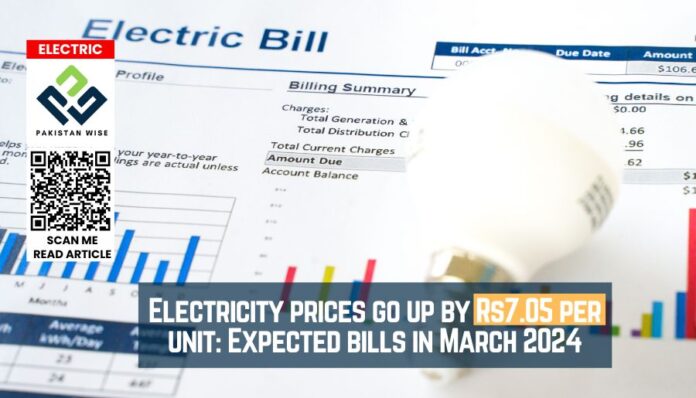Electricity prices go up by Rs7.05 per unit: Expected bills in March 2024
Recently, the National Electric Power Regulatory Authority (NEPRA) announced that electricity prices in Pakistan are going up by Rs7.05 per unit. This change is due to shifts in fuel costs for January 2024 and has been approved by NEPRA. This article explores why prices are increasing, how it affects you, and what it means for the economy.
Fuel Cost Changes and How It Affects You:
The Central Power Purchasing Agency (CPPA) suggested increasing fuel costs, causing a Rs7.05 per unit rise in electricity prices. This could add an extra burden of Rs66 billion on consumers. But don’t worry, K-Electric and some low-income consumers won’t be affected by these changes. The extra cost will be added to your March 2024 electricity bill, so be prepared for that. This clear billing helps you know about the changes and plan your budget accordingly.
Gas Prices Are Going Up Too
At the same time, gas prices in Pakistan are also increasing, with a significant rise for residential users and fertilizer plants. This move aims to recover Rs242 billion from consumers and has been approved by the government. The changes started on February 1st after a notice from the Oil and Gas Regulatory Authority (OGRA).
Related Article: SEPCO ONLINE BILL – How To Check and Pay SEPCO Bill
Why These Changes? Meeting IMF Conditions:
It’s important to know that these price increases aren’t random; they are part of a plan to meet conditions set by the International Monetary Fund (IMF). Especially the increase in gas prices is a strategic move to meet financial goals and follow IMF’s rules.
What It Means for You and the Economy:
Although some people, like K-Electric and lifeline consumers, won’t be affected much, the overall impact of these electricity and gas price hikes is significant. With an extra cost of Rs66 billion for electricity consumers and a big increase in gas prices, there are worries about how affordable essential services will be for everyone.
The impact goes beyond individuals, as higher energy costs can affect different parts of the economy. This could lead to problems in production, employment issues, and a slowdown in overall economic growth. Businesses, especially those using a lot of energy, might find it tough to stay competitive, which could lead to job losses and economic challenges.
Related Artical: Pakistan’s Energy Crisis: Pakistan’s $1.2 Billion Debt to Chinese Power Producers
Conclusion:
To sum it up, the recent increases in electricity and gas prices in Pakistan have many layers, affecting both individuals and the wider economy. Knowing why these changes are happening and their connection to IMF conditions is crucial. Even though there are attempts to lessen the impact on certain groups, we need to carefully think about the economic consequences. As Pakistan faces these challenges, being open, communicating clearly, and making wise decisions will be essential to address public concerns and ensure the country’s steady economic growth.

